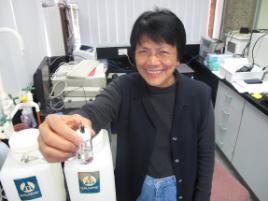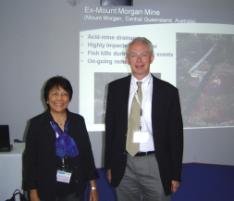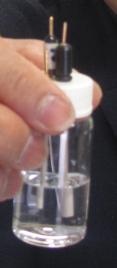Spanish meet hears how electrochemical sensors work in Mt Morgan waters
Published on 05 August, 2010
CQUniversity electroanalytical chemist Dr Vicky Vicente-Beckett* has visited Spain to provide an update on the potential of electrochemical sensors to a gathering of international colleagues in the discipline...
The senior lecturer and researcher attended the 20th anniversary of the International Conference of the European Society of Electroanalytical Chemistry (ESEAC) in Gijon, Asturias, Spain on June 20-24.
She contributed an oral paper on the use of bismuth-filmed carbon nanotubes to enhance the sensitivity of conventional glassy carbon electrodes for the detection of heavy metals such as cadmium and lead.
Dr Vicente-Beckett also gave a poster paper on the use of a self-asssembled monolayer of L-cysteine on gold for selective detection of copper.
Both electrochemical sensors were successfully applied in the analyses of cadmium, lead and copper in natural waters (Dee River) and in acidic mine waters (from the tailings dam of the former Mount Morgan Mine) without any special sample preparation required.
The CQUniversity researcher's presentations were well-received and she was commended for validating the analytical performance of the probes, not only in the laboratory (which is the common practice) but also by testing them out in the field.
The conference included 240 participants from 40 countries, and Dr Vicente-Beckett had the pleasure of representing both CQUniversity and Australia.
"As there are only about 10 research groups within Australia involved in the field of electroanalytical chemistry, it was a great opportunity to share what my research students and I have been doing at CQUniversity and to interact with international researchers and postgraduate students, particularly from the US, Portugal, Spain, Sweden, the Netherlands, Poland, the Czech Republic and Thailand," she said.

Dr Vicente-Beckett shows off one of the sensors
Dr Vicente-Beckett was also given a few samples of disposable sensors, marketed by the conference's major instrument sponsor, DropSens (Spain). She plans to try them out and compare their performance with the sensors developed in her research laboratory.
Vicky has recently commenced research collaboration with QUT, UTS, CQUniversity researchers and others on two NIRAP**-funded projects to develop and test forensic and environmental electrochemical sensors, incorporating nano-materials such as carbon nanotubes.
* Dr Vicente-Beckett is a Senior Lecturer with the School of Medical & Applied Sciences and a researcher affiliated with the Centre for Environmental Management.
** National and International Research Alliances Program (NIRAP).



